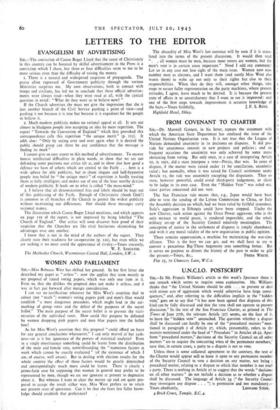FROM COVENANT TO CHARTER •
Sta,—Dr. Maxwell Garnftt, in his letter, repeats the statement with which the American State Department has confused the issue of the United Nations Organisation veto. It is not true that the League of Nations demanded unanimity in its decisions on disputes. It did pro- vide for unanimous consent to new projects and policies ; and on frequent occasions the unanimity was only achieved by some states abstaining from voting. But only once, in a case of interpreting Article to, in 1921, did a state interpose a veto—Persia, that was. In cases of dispute, if the matter were raised under ix for conciliation, unanimity ruled ; but normally, when it was raised for Council settlement under Article 15, the rule was unanimity excepting the disputants. Thus no state, however powerful, could avoid third-party judgement, or claim to be judge in its own case. Even the " Hidden Veto " was ruled out, since parties concerned did not vote.
The San Francisco rule means that, e.g., Japan would have been able to veto the sending of the Lytton Commission to China, or Italy the Assembly decision on which, had we been ruled by faithful statesmen, Italy's aggression in Ethiopia could have been stopped. Under the new Charter, such action against the Great Power aggressor, who is the only menace to world peace, is rendered impossible, and the whole military set-up of the Security Council relatively meaningless. The conception of justice in the settlement of disputes is simply abandoned, and with it any moral validity of the new organisation in public opinion.
There remains opportunism, a machine for maintaining the war-time alliance. This is the best we can get, and we shall have to try to convert a precarious Big-Three hegemony into something better. But it serves no purpose to distort the history of the past in order to gild
the present.—Yours, &c., FREDA WHITE. Flat 25, 70 Chancery Lane, W .C.2.


























 Previous page
Previous page